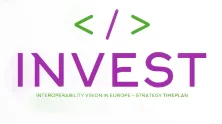
In late April, partners from both the GovTech4All and INVEST projects gathered for a joint GovTech4All Café to discuss the future of digital public services in Europe.
The focus was on the growing importance of interoperability, GovTech, and the recently adopted Interoperable Europe Act. Here are some of the key insights and reflections from the session.
Two Projects with a Shared Purpose
GovTech4All and INVEST are both co-funded by the Digital Europe Programme and aim to develop more innovative, efficient, and interoperable digital services across Europe’s public sector. With 29 organisations from 20 countries in GovTech4All and a fast-paced working group in INVEST, the projects show how cross-border collaboration can be a true driver of innovation.
The Interoperable Europe Act – A Framework for Future Digital Services
Stefanos Kotoglou from DIGIT (European Commission’s Directorate-General for Digital Services) presented the Interoperable Europe Act, the first piece of EU legislation to define and formalise the concept of GovTech. It marks a milestone in the digital transformation of the public sector and offers a framework for how countries and public administrations can reuse, certify, and collaborate around digital solutions.
The Act is based on key principles such as:
- Interoperability by design – solutions that are open and interoperable from the start.
- GovTech sandboxes – safe environments for public-private testing of new technologies.
- Support for SMEs and startups – recognising small actors as key drivers of innovation in the GovTech ecosystem.
GovTech as an Engine for Innovation
GovTech is about technology-based cooperation between public and private actors. It’s not just about tools and platforms—it’s about needs, trust, and human-centred design. It’s about:
- Simplifying citizen-facing services.
- Streamlining decision-making processes.
- Making it easier for startups and SMEs to engage with the public sector.
A concrete example discussed was GovTech4All’s design challenge methodology, where municipalities define their problem statements rather than prescribe specific technologies—opening the door for innovative solutions from a wider range of startups across Europe.
INVEST – A Catalyst for Sustainable Change
Antonios Stasis (Greece) highlighted INVEST’s ambition to go beyond being “just a project” and act as a catalyst for long-term cooperation. The project identifies national digital solutions with European potential and seeks to create shared digital infrastructure—such as through a European Digital Infrastructure Consortium (EDIC)—to support broader collaboration between Member States.
Three Pillars for Success
GovTech efforts in Europe are built on three pillars:
- Knowledge sharing – through open platforms, guides, and case studies.
- Policy guidance – helping Member States embed interoperability in regulation and service design.
- Experimentation – through testbeds, pilots, and real-world prototyping.
As several underlined, we must start from real-world problems—not from the technology. Innovation is rooted in actual needs, and flexible solutions are essential in a rapidly evolving digital landscape.
What’s Next?
Upcoming steps include:
- Continued work under the second Specific Grant Agreement in GovTech4All, launching eight new pilots across 2025–2027.
- Stakeholder interviews and ecosystem mapping through the INVEST project to identify synergies and common needs across Member States.
---------
This blog post captures key takeaways from the latest GovTech4All Café, where the focus was on interoperability, innovation, and cross-border collaboration. Discussions highlighted how the Interoperable Europe Act and projects like GovTech4All and INVEST are shaping the future of digital public services. Shared frameworks, regulatory sandboxes, and support for startups are paving the way for smarter, more connected governance. Read on to explore how Europe is building a trusted digital ecosystem.
Shared on

